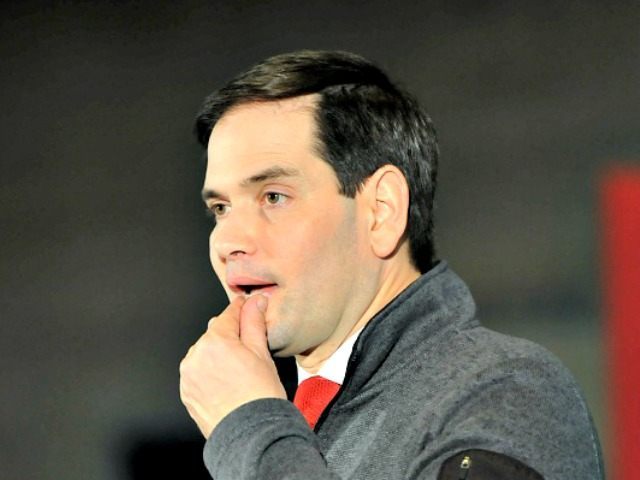The final Des Moines Register poll on the Iowa Caucus confirms a two-person race between Donald Trump and Ted Cruz. While Marco Rubio comes in a distant third, his support is far weaker than either of the two frontrunners. Almost half his supporters say they may still change their mind before the caucus on Monday.
The final poll standings place Donald Trump in first with 28 percent of the vote. Texas Sen. Ted Cruz is a close second, at 23 percent. Marco Rubio is third with just 15 percent support.
Almost half of Rubio’s supporters, 47 percent, however, say they could still change their minds before the caucus on Monday. This makes his support, even in third place, far softer than that of either Trump or Cruz.
More than 70 percent of Trump’s supporters say their mind is made up on backing Trump. Over 60 percent of Cruz supporters say they are committed to backing the Senator. The drop-off in firm support for Rubio is dramatic. The support for Rubio, in fact, is softer than that for the rest of the Republican field.
The political class in Washington, and on the airwaves at Fox News, have predicted a surge in support for Marco Rubio in recent days. The predicted rise for Rubio is based on a theory that mainstream Republicans will coalesce behind the Senator as an alternative to Trump or Cruz.
One chief problem with this argument is that it isn’t true. In the final Register poll, Trump has a 13 point lead over Rubio among self-identified “mainstream Republican” voters. Trump leads Rubio with this group 34-21. Cruz is a very distant third with 10 percent support.
A further setback for Rubio is that the Register poll anticipates that “mainstream Republicans” will make up around 40 percent of the total caucus vote on Monday. This seems high, but even if this block did materialize in the anticipated numbers, he is losing this group badly to Trump.
Rubio’s challenge of course is compounded by the fact that his support is not as strong as that of either Trump or Cruz. This explains the Rubio campaign’s decision to air a special 30-minute campaign ad in Iowa this weekend. In the closing hours, Rubio needs to shore up his own support in addition to trying to attract new voters.
The nature of the caucus puts a large premium on how strongly a voter is backing a candidate. After voters arrive at the caucus, each campaign can make an explicit pitch on behalf of their candidate. Voters often change their minds, even after they’ve showed up to participate in a caucus.
In 2008, almost 20 percent of Republican voters said they made up their mind on whom to support on the day of the caucus. If Rubio’s support is soft going into the caucus, his supporters may peel off to support either Trump or Cruz.
Like most things with the Rubio campaign, the idea that mainstream Republicans are propelling a late surge for him in Iowa is a nice theory. Again, though, this theory of Rubio crashes on the rocks of reality.

COMMENTS
Please let us know if you're having issues with commenting.